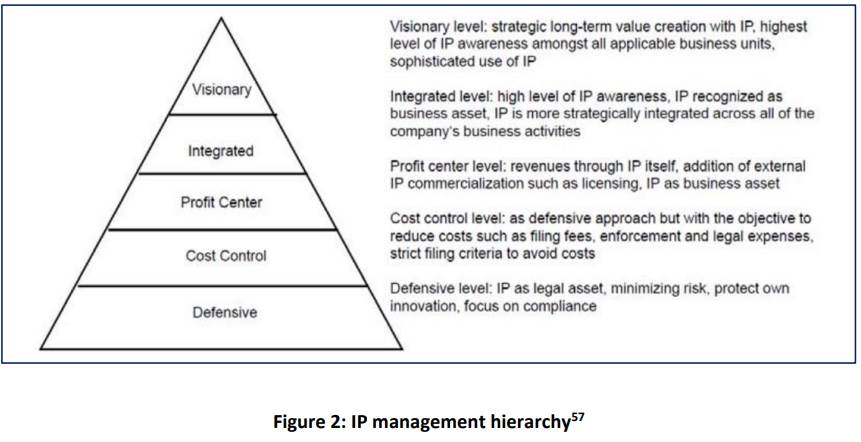How to improve SMEs’ IP capabilities with prediagnosis: New research project at MIPLM
Numerous studies have shown that the contribution of SMEs concerning innovation performance is important for the European economy. At the same time, empirical data shows insufficient and incomplete use of IP by many SMEs in Europe. Although the relevance of the intellectual property within the innovation is obvious, European small and medium-sized enterprises (SMEs) do not make full use of the IP system to their benefit. Europe has 25 million small and medium enterprises, being the backbone of the economy of the EU. These SMEs employ around 100 million people and account for more than half of Europe’s GDP. Nonetheless, Eurostat data shows that although 50% of SMEs report innovation activities, yet only 9% have registered intellectual property rights (IPRs).
Innovation critically depends on a range of conditions such as finance, skills, markets, competition and standards, policy framework, and, what is of great importance, intellectual property rights (IPRs). The intellectual property system can be seen as one of the most critical role in the innovation process today. Rights such as patents, trademarks, designs and copyrights, provide innovators exclusive right to use their knowledge creations and to facilitate knowledge and technologies transfer.

Figure 1: The differences between IP administration (left box) and IP management (right box)
The 21st century may be best characterized as a knowledge and information era in which access to creative knowledge and information constitutes competitiveness. Peter Drucker defined innovation as ‘the creation of new ideas/processes which lead to change in an enterprise’s economic or social potential’ (Drucker 1998). The term “innovation” refers to both the creative process of applying knowledge, and the outcome of that process. Through innovation, knowledge is applied to the development of new products and services, or to new ways of designing or marketing an existing product or service (WIPO 2020). Innovation can be promoted systematically across the economy as part of a deliberate strategy to improve growth in national productivity. The conscious promotion of innovation has become an important focus of economic and social policy (WIPO 2020).

The aim of this thesis is to identify the role of the different IP Pre-diagnostic (IPPD) or similar services currently offered or being presently established by national IP offices for European SMEs. The study provides a broad descriptive overview of the main IPPD services currently provided, via a case-study methodology, of four national European IP Offices. This study concludes that the available IP Pre-diagnostic services are heterogeneous and range from a simple IP assessment to complex personalized IP management analysis, provided either by IP legal experts or national IP office´s personnel experienced in specific IP rights.
 In a general context, the four cases studies agreed that IP Prediagnostic service can be identified as a process for which IP outputs can be described in three stages:
In a general context, the four cases studies agreed that IP Prediagnostic service can be identified as a process for which IP outputs can be described in three stages:
(i) an IP asset inventory;
(ii) an IP Management Assessment; and
(iii) an IP Management Action Plan.
Furthermore, the study concludes with the recommendations:
- further exploratory studies in the area of IP Prediagnostic services with SMEs are needed in the area of IP management, specifically from a quantitative analysis viewpoint, in order to investigate further the typologies of SMEs that are making use of this service as to their level of IP management within the IP management hierarchy identified by Davis and Harrison (2001), and to explore the effectiveness of the service in assisting European SMEs to identify and achieving economic benefits from IPRs ownership via IP management;
- whether such a service should also be expanded to include the aspect of carrying out an IP valuation within same or after such an IP Prediagnostic exercise;
- having identified such heterogenous options of IP Prediagnostic services delivered by national IP offices, research would also be appropriate into investigating the costs / benefits of creating and adopting a Pan-European IP Prediagnostic service to be used by European national IP Offices and
- whether one can adopt an IP Quality Management standard towards such Pan-European service as a measure of assurance in quality delivery and evaluation.
The research project was conducted by MIPLM graduate Ivan Gauci and supervised by Prof. Dr. Alexander Wurzer and Dr. Thibaud Lelong both CEIPI.
 Ivan Gauci is an intellectual property expert, a marketing strategist and a people person with a diverse commercial experience spanning both the private and governmental sectors. Until recently he held the position of Assistant Director at the national IP Office of Malta and is currently seconded as a national expert at the European Union Intellectual Property Office (EUIPO) where he is directly involved in the design and implementation of the EUIPO SME Programme 2020-25. Being a positive disruptor and a generalist, Ivan is active in various intellectual property specialisms particularly in strategic IP management and IP education for small-medium enterprises (SMEs).
Ivan Gauci is an intellectual property expert, a marketing strategist and a people person with a diverse commercial experience spanning both the private and governmental sectors. Until recently he held the position of Assistant Director at the national IP Office of Malta and is currently seconded as a national expert at the European Union Intellectual Property Office (EUIPO) where he is directly involved in the design and implementation of the EUIPO SME Programme 2020-25. Being a positive disruptor and a generalist, Ivan is active in various intellectual property specialisms particularly in strategic IP management and IP education for small-medium enterprises (SMEs).
In 2021, Ivan undertook the Master of Intellectual Property Law and Management at CEIPI, University of Strasbourg.
Here is a description of the research project:



